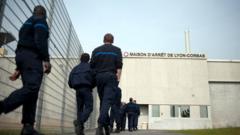In a significant move, India's Directorate General of Civil Aviation (DGCA) has mandated that airlines in the country inspect fuel control switches in Boeing aircraft, following a catastrophic incident in June that resulted in the loss of 260 lives aboard Air India Flight 171. The decision comes in the wake of the US Federal Aviation Administration's (FAA) assertion that the fuel control switches are safe, despite their crucial role in the disastrous flight, which saw fuel supply to the engines cease shortly after take-off.
India Mandates Inspection of Fuel Control Switches in Boeing Jets Following Air Crash

India Mandates Inspection of Fuel Control Switches in Boeing Jets Following Air Crash
India's aviation regulator directs airlines to conduct inspections amidst safety concerns linked to a recent fatal Air India incident.
The DGCA's directive requires the checks to be conducted by July 21, stressing the importance of adhering to this timeline to maintain operational safety standards. This order aligns with a non-mandatory 2018 FAA advisory that recommended inspections of the locking feature of fuel cut-off switches, highlighting that the switches should not be accidentally modified.
The investigation revealed that the plane's fuel switches were mistakenly moved to the "cut-off" position, constraining engine thrust and contributing to the crash. This preliminary report detailed cockpit communications wherein one pilot questioned why the fuel was cut off, to which the response was that it was not an intentional act. The significance of the report lies not in attributing blame but in identifying safety issues to prevent future disasters.
In response to the findings, the Indian Commercial Pilots' Association defended the actions of the flight crew, stating they acted according to their training during challenging circumstances. As a parallel development, South Korean authorities are also considering similar inspections for their Boeing-operating airlines in light of safety concerns raised by the situation.
The aviation community is on high alert, and the DGCA’s swift action reflects its commitment to ensuring passenger safety in the aftermath of one of the gravest air accidents in recent history.
As investigations and inspections proceed, all stakeholders remain focused on restoring confidence in the safety of air travel.
The investigation revealed that the plane's fuel switches were mistakenly moved to the "cut-off" position, constraining engine thrust and contributing to the crash. This preliminary report detailed cockpit communications wherein one pilot questioned why the fuel was cut off, to which the response was that it was not an intentional act. The significance of the report lies not in attributing blame but in identifying safety issues to prevent future disasters.
In response to the findings, the Indian Commercial Pilots' Association defended the actions of the flight crew, stating they acted according to their training during challenging circumstances. As a parallel development, South Korean authorities are also considering similar inspections for their Boeing-operating airlines in light of safety concerns raised by the situation.
The aviation community is on high alert, and the DGCA’s swift action reflects its commitment to ensuring passenger safety in the aftermath of one of the gravest air accidents in recent history.
As investigations and inspections proceed, all stakeholders remain focused on restoring confidence in the safety of air travel.





















